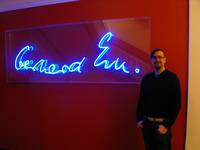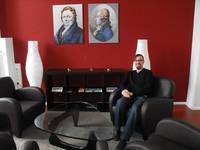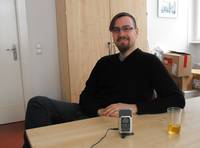Scientific exchange for young Ph.D. students / Impressions of the joint meeting on 18.-19. March 2013 / Interview with Martin McBriarty
Martin McBriarty (26) is a Ph.D. candidate in Materials Science and Engineering at Northwestern University (NU) in Prof. Michael J. Bedzyk’s group. He spent one year as an exchange Ph.D. student at the Fritz Haber Institute in Prof. Hans-Joachim Freund’s group.
UniCat asks him about his experiences with the UniCat NU exchange and about his impressions of the UniCat Northwestern joint meeting in March. At the end of the UniCat Northwestern meeting, UniCat and NU decided to aim for three students from UniCat and three students from Northwestern University to switch over starting as early of this fall. For instance, Sebastian Arndt from Prof. Reinhard Schomäcker’s group will be joining Prof. Tobin Marks group this summer as a DFG Postdoctoral Fellow to work on areas of joint Unicat-NU interest. CCSS is trying to arrange a mechanism by which a UniCat graduate student can also spend an extended time at Northwestern.
How did you become aware of the UniCat Northwestern University exchange?
Martin McBriarty: I was aware of UniCat and the Northwestern UniCat collaboration from when I began with my research work, shortly after I started my Ph.D. in Michael Bedzyk’s group. Mike had mentioned that there was a collaboration very early on. We talked about it occasionally, and at one point I decided that this was something that I wanted to pursue.
There wasn’t yet a mechanism for transferring Ph.D. students, so I decided to apply for the Fulbright fellowship. I was awarded a Fulbright Full Grant, which covered 10 months of research in Germany. Both the Fulbright (see also Fulbright.gov) and the DAAD fellowships go both ways, from the U.S. to Germany and vice versa.
At the end of the UniCat Northwestern meeting, we decided to aim for three students from UniCat and three students from Northwestern University to switch over starting as early of this fall. We are working out the best way to make this happen.
What are the advantages of the UniCat Northwestern University exchange for your Ph.D. and research work?
Martin McBriarty: The Chemical Physics group at the Fritz Haber Institute specializes in local probe methods which reveal defects and local film morphology. These are details that we cannot easily observe by the synchrotron X-ray techniques that my group at Northwestern uses. However, these are two very complementary approaches. For example, the X-ray standing wave method is very sensitive to thin film structure in the surface normal direction, whereas scanning tunnelling microscopy has very good lateral resolution. By putting these two techniques together, one can get a much more complete atomic-scale picture of the structure of model catalyst surfaces and films. This is a significant goal of my research.
What are the advantages for your CV and your soft skills?
Martin McBriarty: You might have heard of "learning by osmosis". At the Fritz Haber Institute, one is surrounded by some of the most talented and knowledgeable scientists in surface chemistry and catalysis. With so many chances to interact with these experts, whether by questions and discussions or research talks and colloquia, one learns quite a lot very quickly. These kinds of interactions frequently pushed me just far enough outside of my comfort zone for me to learn something new, without being too familiar or too obscure. Working with such a concentration of talents in my own field, thereby gaining fresh perspective on my research, was the most rewarding part of being at the institute.
What advice would you give to other UniCat Ph.D. students?
Martin McBriarty: Try to be open to new things. As students of science, we're naturally curious, but it's easy to get caught up in a particular project or set of methods. Working in a new environment and interacting with new people will expand your knowledge and your personal "tool kit" for solving research problems.
Also, for me, it was fascinating to learn about the differences in the organization and politics of research in Germany versus in the U.S. alongside the more general cultural differences. In the future, I think this perspective will help me to collaborate better with colleagues from Germany (and anywhere else). Seeing how research culture differs from one place to another is a powerful thing - it helps to understand where your colleagues are coming from.
What are your impressions of the UniCat Northwestern University joint meeting?
Martin McBriarty: It was really interesting to see the diversity of research coming from the UniCat cluster. I was particularly excited to find out where the research from both institutions intersected, where groups from both sides are studying similar materials systems or phenomena. We had related projects that we could actually mesh together. It only makes sense that there will be some intersection between two catalysis programs as large as those in Berlin and Northwestern, but our collaboration will really help us to exploit that intersection.
What do you think were the highlights of the UniCat Northwestern University meeting?
Martin McBriarty: Hearing from researchers from each side of the collaboration is very stimulating - it really illuminates the idea of “unifying concepts in catalysis”. Finding out about our shared interests in particular phenomena was a highlight for me. At several points in the meeting the idea of synergy between different cations in different materials systems was mentioned. Changes in the reducibility of vanadium cations, for example, in the proximity of other promoter cations in mixed catalyst systems is something that we have been thinking about in Mike Bedzyk’s group at Northwestern. We have spectroscopic and structural evidence that certain cations enable the catalytic activity of other cations nearby, a promotional effect that has been reported in real catalyst systems but is not thoroughly understood. Our hypotheses of these effects in our own work are supported by the research of people like Joachim Sauer and Reinhard Schomäcker.
Also, I really enjoyed Hajo Freund’s talk. He has an excellent way of putting a story together, drawing from a lot of different parts of research from his department to illustrate one underlying concept very clearly. For me, speaking with Prof. Freund is always enlightening. I find it valuable to meet different people with different sets of experiences, different ways of communicating, speaking their own dialects of science. Meeting and talking with new people improves the chances that you'll find someone who is speaking your dialect. The more people you talk to, the more likely it is that you'll find people who stimulate your curiosity.
Thank you very much for the interview.



